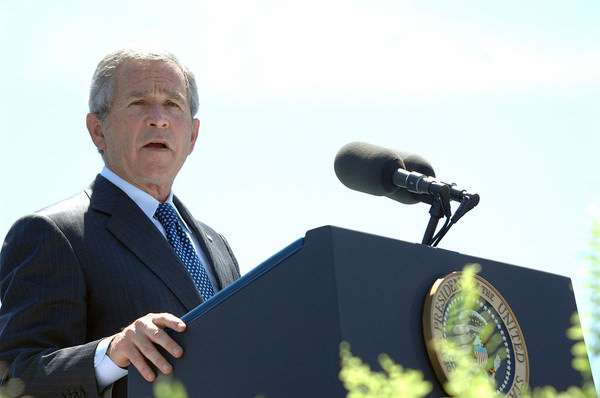The United States of America Did Torture, Actually
Few Americans realize what cruelties have been inflicted in their name.
The autopsy gave a spare account of how the 52-year-old man died. He suffered blunt force injuries on his torso and legs, and abrasions on his left wrist indicated he had been tied or shackled down. One of his neck bones was fractured. Death came "as a result of asphyxia (lack of oxygen to the brain) due to strangulation," and it was ruled a homicide.

It's too much to hope for justice in this case, though. That's because the homicide came at the hands of the administration of George W. Bush. The victim was an Iraqi whose demise occurred while he was in American custody. He was one of some 100 people who since 2001 have died while our government was holding them, some of whom were tortured to death.
The advocates of "enhanced interrogation" make it sound simple and effective. An uncooperative terrorist gets waterboarded and quickly agrees to spill vital secrets, or gets weary of being cold and sleep-deprived and divulges plots in time to stop them.
Dick Cheney and Co. never dwell on the captives who were subjected to prolonged and escalating brutality that failed to elicit the desired information -- possibly because they didn't have it. Those who favor this approach don't mention the inmates who will never talk because they are in their graves.
Some of the tortured survived the ordeal. But living or dead, they have been consistently ignored by the American people, few of whom realize what cruelties have been inflicted in our name.
The victims were ignored again last week when an independent commission issued a report that said, "Perhaps the most important or notable finding of this panel is that it is indisputable that the United States engaged in the practice of torture." The report was released Tuesday -- as the Boston Marathon bombs were eclipsing all other news.
It deserved far more attention than it got. The panel was not a choir of squeamish liberals and al-Qaida apologists. It included former Rep. Asa Hutchinson, R-Ark., who chaired a National Rifle Association task force after the Newtown massacre, William Sessions, who served as FBI director under President George H.W. Bush, and Thomas Pickering, that president's UN ambassador.
The 11 members had no trouble establishing that the Bush-Cheney techniques qualified as torture and "occurred in many instances and across a wide range of theaters" -- from Afghanistan to Guantanamo Bay. They found this approach had "no justification."
They determined that Bush and his senior aides "bear ultimate responsibility for allowing and contributing to the spread of illegal and improper interrogation techniques." They found no evidence that torture "produced significant information of value" -- but plenty that much of the information "was not useful or reliable."
As president, Bush insisted he was staying within the white lines. He assured the world, "The United States of America does not torture." His champions say the methods he approved did not qualify for that term.
But you don't have to take the word of the American Civil Liberties Union on what constitutes torture. You can take the word of the Bush administration. In its assessment of foreign governments, the panel noted, the U.S. government "has routinely and firmly condemned as torture and/or abuse many of the same techniques used by U.S. personnel against detainees over the course of the past decade."
It condemned Jordan for subjecting inmates to "forced standing in painful positions for prolonged periods." Waterboarding? A form of torture when used by Sri Lanka and Tunisia. Sleep deprivation? When Iran, Libya and Saudi Arabia do it, it's an outrage.
There is no way to prove that in some case at some time, an exercise in sadism might not cause a hardened terrorist to reveal everything. But theoretical payoffs don't excuse practices that the U.S. government has declared off-limits for every other country. Nor can they justify violating the international Convention Against Torture -- signed and celebrated by President Ronald Reagan.
That treaty had a provision especially relevant in the aftermath of 9/11. It said, "No exceptional circumstances whatsoever, whether a state of war or a threat of war, internal political instability or any other public emergency, may be invoked as a justification of torture." Torture, as Reagan understood, is not sometimes wrong. It's always wrong.
Those who pretended otherwise made a choice that inflicted intense suffering and painful death on enemies real and imagined. For Bush, Cheney and their accomplices, that choice should be a lasting disgrace.


Show Comments (72)